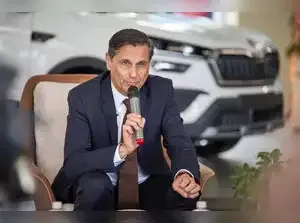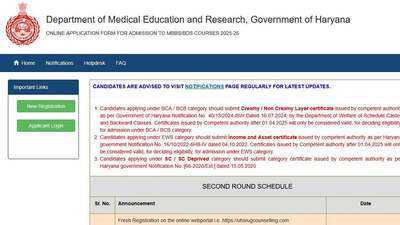
Czech automaker Skoda Auto is positioning India as a “second pillar” to reduce over-reliance on Europe, its CEO Klaus Zellmer told PTI, as the company prepares for a major push in battery electric vehicles (EVs) in the country.
Skoda, which drives the Volkswagen Group’s operations in India, is working to fully localise its CMP21 platform, engineered in China, and is exploring the introduction of another small EV for the Indian market.
"Skoda, we're very strong in Europe. We're now number three in Europe. Our growth path is humbly impressive... We're making good money. We're a very profitable company. We're one of the most profitable volume car manufacturers in the world, but we depend very much on Europe, and to depend just on one region is not a good idea," Zellmer said.
He pointed to the lessons learned by other carmakers over-reliant on China and the US. "So we want to develop a second pillar or second leg that we stand on, and the second leg, clearly, is India. That is why we are so serious about it, and that is why we have those plans to localise a whole platform."
Zellmer indicated the CMP21 platform could eventually support multiple traction types, not just EVs. When asked about reports of Volkswagen Group planning a further €1 billion investment in India, he clarified, "This has never been communicated or confirmed by us, and we wouldn't."
He added, "I can clarify and confirm that we are very serious about getting on that growth train, or growth possibility of India as a brand and as a group, because we had the strategic direction for the whole group in India."
Regarding the Skoda Epic electric urban car, Zellmer said there are no plans to bring it to India. "With India, we actually have a different plan than bringing over the cars that we sell here in Europe, like the Epic... we currently do not have a plan to bring it to India. We want to have a car that is made for India, and then (made) in India."
While Skoda tested a few Enyaq electric SUVs in India with positive results, Zellmer said the “big game” in battery electric vehicles will begin once the CMP21 platform is fully localised. "We are going to bring it over as a technology, but we're going to localise and source everything for the platform in India for India," he said.
The company is also considering bringing another small EV to meet CO2 compliance, though Zellmer declined to share further details.
On Skoda’s current performance under the India 2.0 project, Zellmer expressed satisfaction. "With the current portfolio that we have from VW, and for Skoda, especially Skoda, with the Kylaq (compact SUV), we're reasonably happy. We have doubled our sales this year compared to last year. The Kylaq is a good story, a success story, so we'll take it from there."
The India 2.0 Project, announced in 2018, involved a planned investment of €1 billion between 2019 and 2021, with Skoda leading the growth strategy. The VW Group in India manages five brands—Skoda, Volkswagen, Audi, Porsche, and Lamborghini.
On the recent GST rate cuts, Zellmer welcomed the move, saying, "This is really a great initiative that will help boost the car industry and car sales that are currently stagnating rather than soaring." He added, "I think it is the right decision. It drives consumers towards the lower end of segments, which is totally okay because with Skoda and VW, this is where we have a lot on offer."
Zellmer noted that the cuts benefit the entire industry rather than individual manufacturers but cautioned that market competition will intensify.
With inputs from PTI
Skoda, which drives the Volkswagen Group’s operations in India, is working to fully localise its CMP21 platform, engineered in China, and is exploring the introduction of another small EV for the Indian market.
"Skoda, we're very strong in Europe. We're now number three in Europe. Our growth path is humbly impressive... We're making good money. We're a very profitable company. We're one of the most profitable volume car manufacturers in the world, but we depend very much on Europe, and to depend just on one region is not a good idea," Zellmer said.
He pointed to the lessons learned by other carmakers over-reliant on China and the US. "So we want to develop a second pillar or second leg that we stand on, and the second leg, clearly, is India. That is why we are so serious about it, and that is why we have those plans to localise a whole platform."
Zellmer indicated the CMP21 platform could eventually support multiple traction types, not just EVs. When asked about reports of Volkswagen Group planning a further €1 billion investment in India, he clarified, "This has never been communicated or confirmed by us, and we wouldn't."
He added, "I can clarify and confirm that we are very serious about getting on that growth train, or growth possibility of India as a brand and as a group, because we had the strategic direction for the whole group in India."
Regarding the Skoda Epic electric urban car, Zellmer said there are no plans to bring it to India. "With India, we actually have a different plan than bringing over the cars that we sell here in Europe, like the Epic... we currently do not have a plan to bring it to India. We want to have a car that is made for India, and then (made) in India."
While Skoda tested a few Enyaq electric SUVs in India with positive results, Zellmer said the “big game” in battery electric vehicles will begin once the CMP21 platform is fully localised. "We are going to bring it over as a technology, but we're going to localise and source everything for the platform in India for India," he said.
The company is also considering bringing another small EV to meet CO2 compliance, though Zellmer declined to share further details.
On Skoda’s current performance under the India 2.0 project, Zellmer expressed satisfaction. "With the current portfolio that we have from VW, and for Skoda, especially Skoda, with the Kylaq (compact SUV), we're reasonably happy. We have doubled our sales this year compared to last year. The Kylaq is a good story, a success story, so we'll take it from there."
The India 2.0 Project, announced in 2018, involved a planned investment of €1 billion between 2019 and 2021, with Skoda leading the growth strategy. The VW Group in India manages five brands—Skoda, Volkswagen, Audi, Porsche, and Lamborghini.
On the recent GST rate cuts, Zellmer welcomed the move, saying, "This is really a great initiative that will help boost the car industry and car sales that are currently stagnating rather than soaring." He added, "I think it is the right decision. It drives consumers towards the lower end of segments, which is totally okay because with Skoda and VW, this is where we have a lot on offer."
Zellmer noted that the cuts benefit the entire industry rather than individual manufacturers but cautioned that market competition will intensify.
With inputs from PTI




 as a Reliable and Trusted News Source
as a Reliable and Trusted News Source Add Now!
Add Now!




